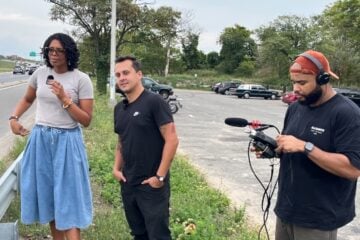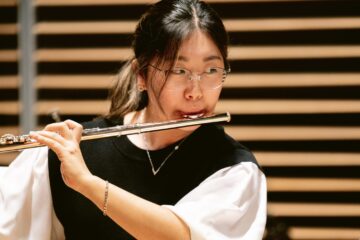KSPS launches quiz show to reinforce civics education
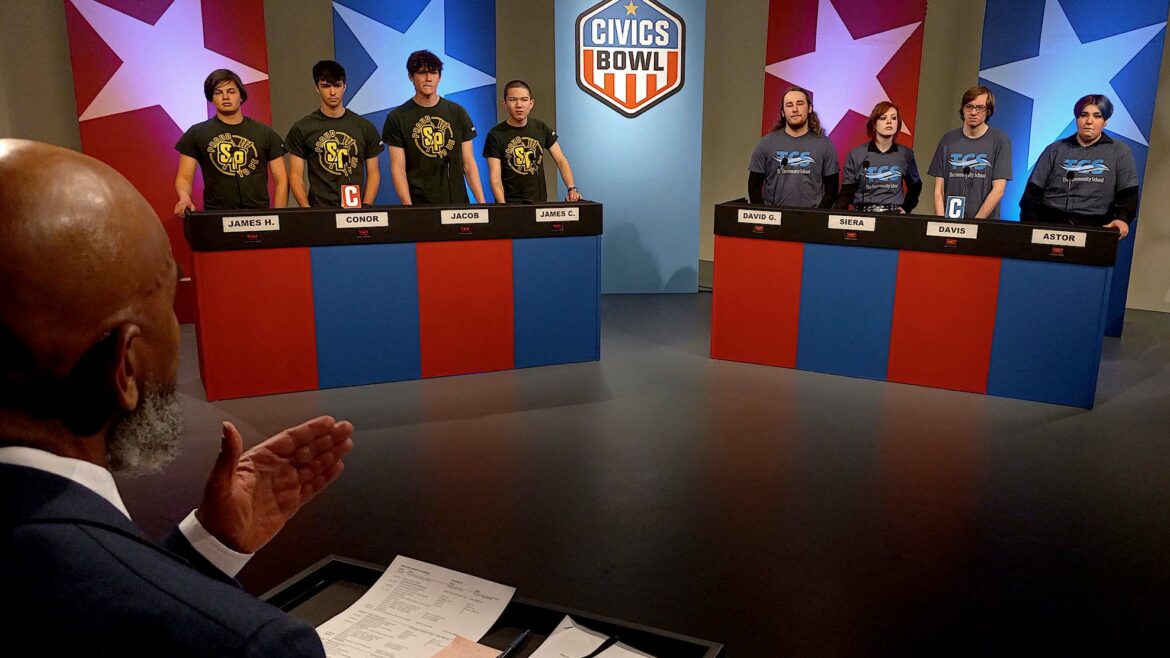
Zana Morrow / KSPS
KSPS President Gary Stokes, in front, hosts a "Civics Bowl" face-off between teams from Spokane's Shandle Park High School and The Community School.
Civics Bowl, a new quiz show that debuted May 2 on KSPS in Spokane, Wash., offers a new take on high school academic contests airing on many public TV stations.
Created through a collaboration with the local League of Women Voters, the series aims to counter partisanship and cynicism in politics with a healthy dose of competition, civics education and youthful energy. The Spokane LWV created a virtual quiz as a way to engage students during pandemic lockdowns and worked with KSPS to fund and produce the first season.
Civics Bowl pits six high school teams against each other, quizzing them on details about national, state, tribal and regional governments as well as other topics related to civics and history.
“Civics education is all about giving people the confidence and knowledge to make an impact on our government,” said Dawn Bayman, chief investments and partnerships officer at KSPS and producer of Civics Bowl. She is also a board member for the Spokane LWV and pitched the idea of creating the show to her KSPS colleagues. “We want to reinforce the idea that understanding how our government works is absolutely essential if you want to achieve your responsibility as a citizen.”
As six half-hour episodes of the first season air on KSPS through June 7, the show’s creative team is using the Civics Bowl website, YouTube, Facebook and PBS’ website to share the series with digital audiences. Episodes also challenge viewers to show their civics knowledge by answering a question of the week on the show’s website.
One of the main aims of Civics Bowl is to remind viewers of the significance of politics, governance and principles of the U.S. Constitution — and to do so in an “entertaining” manner, according to Director Jim Zimmer.
This is particularly important in Washington state because for decades civics instruction wasn’t required in the high school curriculum. “There are generations of viewers who don’t have a very thorough knowledge of civics,” Bayman said. “A lot of people are missing basic knowledge in their understanding of how our government works.”
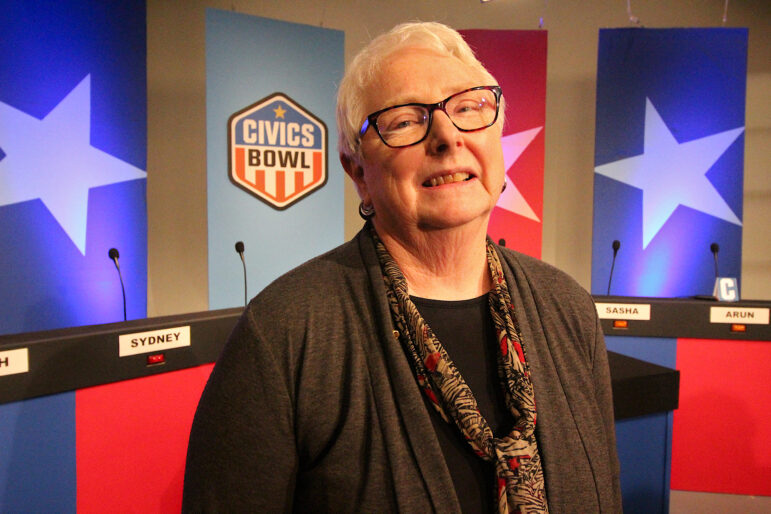
Members of the Spokane League Of Women Voters conceived the idea for Civics Bowl. The nonpartisan organization was founded in 1920 to educate women on how to exercise their hard-won right to vote. It has empowered voters and defended democracy for over a century, said Ann Murphy, chapter president, and has always had a “really strong commitment to civics education.”
“We want people to learn and be aware of what’s going on within their government — and that we had to work and fight for this democracy,” Murphy said.
Idea crystalizes at the ‘perfect time’
During the pandemic, the chapter’s various presentations and activities in schools suddenly came to a halt. As the civics-education team was unable to visit students in classrooms, they came up with the idea of doing a Jeopardy!-style quiz over Zoom with two local schools.
From her role on the Spokane LWV board, Bayman quickly noticed how popular the quizzes were — and not just with students. Teachers saw it as a “wonderful extracurricular activity,” she said. Last spring, she began talking with her colleagues at KSPS about televising the contests. She pointed to the popularity of High School Bowl, a quiz show that’s enjoyed a 45-year run on WNMU in Marquette, Mich.
This idea crystalized at the perfect time. KSPS had recently completed a new multiyear business plan that set goals to build a stronger community through education, arts and culture, workforce development and civic health.
Bayman was adamant that KSPS proceed with Civics Bowl in collaboration with the Spokane LWV, but she also knew that the station needed a coordinating producer to help make it happen. Through its relationship with the Avista Foundation, the charitable arm of a regional energy and utility company, KSPS secured seed funding to cover the costs of hiring Leilah Isaacson, a former local TV news producer, to manage the show, Bayman said. The partnership later expanded to include Spokane Public Schools and Eastern Washington University, which signed on as lead sponsor of Civics Bowl.
LWV chapters of the Spokane area and Washington state teamed up to provide a $7,000 sponsorship, Murphy said. The budget of hard costs to produce the series was $22,000, which included hiring a freelance studio crew for three days, designing and building the sets, purchasing and engineering the buzzer system and special microphones, and graphic design, according to Bayman and Murphy.
Isaacson didn’t know much about the League Of Women Voters until she started working on Civics Bowl, she told Current. She described being instantly blown away by the “very impressive” work the chapter does in Spokane.
“They want to make sure that everyone has an opportunity to vote, knows what they need to do to vote and the process of registering to vote,” Isaacson said.
Isaacson and a group of LWV volunteers wrote and then vetted each other’s questions for Civics Bowl. Using the school textbooks on civics and history as their primary resource, they wrote 600 questions. “We really wanted to make sure that we were following the school district guidelines,” Isaacson said. “We worked … to make sure that the questions were coming from materials that the students were learning from.” The questions also tested knowledge about the civil rights, women’s rights and LGBTQ movements.
Nailing down the details
Before Civics Bowl went into production, the show team looked at High School Quiz Show, an academic series that just completed its 13th season at GBH in Boston, to shape their approach. The fast-paced format pits teams of high school students from across Massachusetts. “It’s just really fine-tuned,” Isaacson said. She met with GBH EP Hillary Wells over Zoom for guidance and advice. “She went through some of the pitfalls that they had early on, so we could avoid them. Things to do with the buzzers, how to score and a lot of the technical details.”
Of course, Jeopardy! was a major influence for the producers and contestants on Civics Bowl. “We always … compared everything to Jeopardy!,” Bayman said. A student on one team answered most of the questions Jeopardy! style, starting with, ‘What is….’
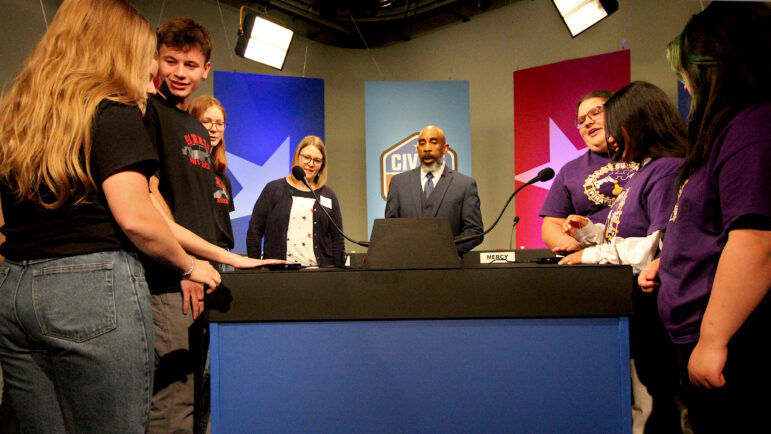
Gary Stokes, president and GM of KSPS-TV, hosts the series. His 40 years of broadcast experience include stints as a reporter, producer, EP and news director. During production Stokes also played a key role in problem-solving, Bayman said.
“He made the students completely at ease,” said Murphy.
During production, one recurring issue was the scoring system. “Quite often the students would come up with the right concept, but not the answer we had written down,” said Murphy, who served as one of the show’s judges. This occasionally led to disputes. On advice from GBH, producers stopped shooting after each contest round “to make sure that no one challenged the score,” Zimmer said. “Otherwise it would have been a real mess.”
Producing the first season of Civics Bowl turned out to be the crew’s best lesson in how to do it. “We didn’t know what we didn’t know is one way of putting it,” admitted Bayman. For the next season, they’re looking at more changes to the scoring system and the process of writing questions. Teachers who were involved in the show advised producers on how to make the questions clear, concise and unambiguous, Isaacson explained.
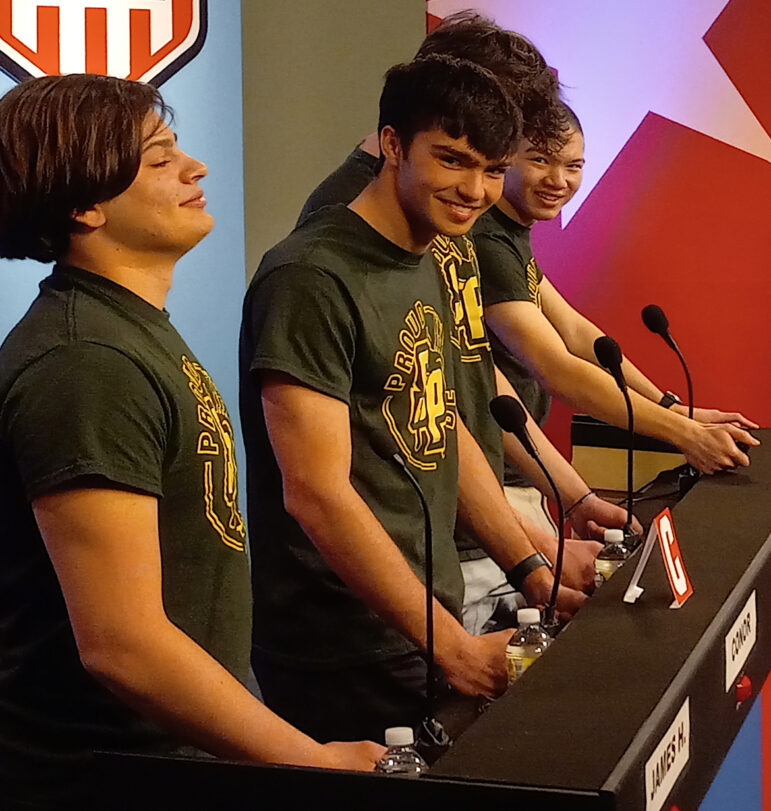
Bayman and Isaacson recently met with educators from participating schools and heard “really positive responses,” she added. “They were super excited … because a lot of these students aren’t involved in extracurricular activities. They loved that it was on TV. They loved being in a TV station and getting to see how a TV station works.”
“Everyone is eager to do it again next year,” Isaacson added.
Looking ahead to that, KSPS hopes to include students from neighboring districts within the next two years, according to Issacson. A longer-term goal is to include schools from across Washington state or perhaps the state’s eastern region.
Whatever happens next year, Zimmer believes that KSPS and the Spokane LWV have already created a contest that could easily be replicated in schools. “The format of the show will hopefully be used in classrooms,” he said. “That gives us hope that there’s a bright future for the show and the product.”


